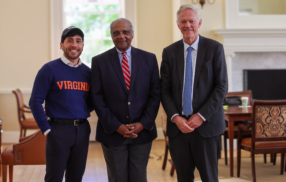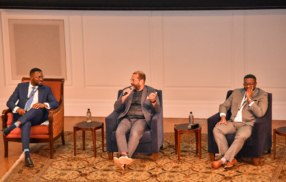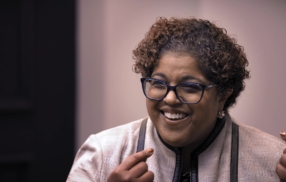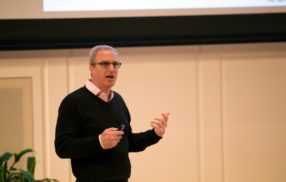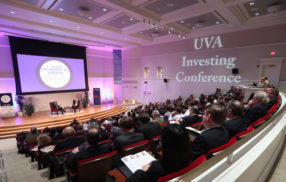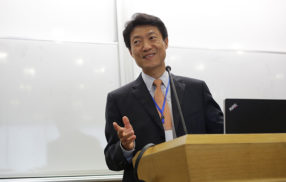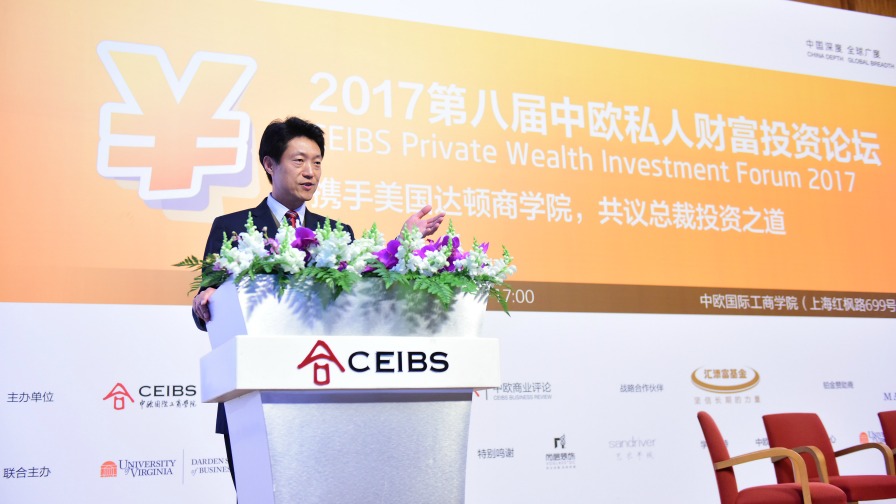
Geopolitical Uncertainty Brews Investing Concerns at Shanghai Forum
By Kate Beach
Given the recent rise of nationalism seen in recent elections and concerns around heightened geopolitical uncertainty, global investors are concerned that world markets may be experiencing a disruption.
The day after United States President Donald Trump and President Xi Jinping of China conducted their first face-to-face meeting in Florida, the 2017 CEIBS Private Wealth Investment Forum — the University of Virginia Darden School of Business’ fourth annual investing summit in Shanghai, hosted in partnership with the China Europe International Business School (CEIBS) — brought together about 400 investors, industry leaders and experts, and academics on 8 April to discuss global market trends, capital flows and investing opportunities.
In today’s uncertain times, political, geopolitical and economic factors will continue to play a substantial role in investment trends and opportunities. One of the keynote speakers, Francisco Aristeguieta, CEO of Citigroup Asia, said he sees China moving in a different direction than the United States, and that China’s influence is likely to increase.
“China has been extremely effective at capturing the space that others leave unoccupied, particularly the United States,” Aristeguieta said. “We see China reaching out, connecting with the rest of the world, engaging with capital flows around the rest of the world.”
Aristeguieta went on to say he believes Asia’s role in global trade will only gain significance, and he sees a trend toward manufacturing diversification in the region with companies seeking flexibility in the midst of regulation and taxation shifts.
As the Trump administration focuses on tax reform, infrastructure and bringing manufacturing jobs back to the United States, technology and automation also emerged as a central theme of discussions around job creation. Technology may act as more of a barrier to job expansion than trade, panelists said.
Haibin Zhu, chief China economist and head of Greater China economic research at JPMorgan, said talks between the Chinese and United States administrations may eventually reach more of a compromise around jobs, as well as energy and economic partnerships at large.
Zhu noted that in 2017, for the first time, “foreign investors are more optimistic than Chinese investors on the Chinese market.” He explained that foreign investors are likely noticing that last year China’s economic performance was higher than expected, recent Chinese fiscal and monetary policies have accommodated business, infrastructure has continued to develop strongly, and 2016 also saw a rebound of the real estate sector.
For 2017, “stability is key,” Zhu said. “The risks to that stability include a potential slowdown of the real estate market, financial tightening and unintended policy consequences, as well as uncertainties surrounding the U.S.-China trade relationship.”
Darden’s Richard A. Mayo Center for Asset Management and the CEIBS Shoushan Centre for Wealth Management co-organized an afternoon break-out session, When East Meets West: How to Allocate Assets Globally. Moderated by Oliver Rui, Zhonghkun Group Chair in Finance at CEIBS and director of the Shoushan Centre, the topics discussed included demographic changes and wealth management, asset allocation in the low interest era, active/passive investment management, and even robo advisors.
Dick Mayo (MBA ’68), chairman of Game Creek Capital, reminded the audience, “We all want to strive to make a return, but if we slip, there could be unfortunate circumstances. Anyone managing a portfolio today needs to think about how to protect that portfolio.” He provided a short history of how U.S. markets evolved to their current position and emphasized that the U.S. is currently experiencing one of the largest and longest bull markets in history. “The market has gone higher for the past 8 years, experiencing worldwide economic recovery. The market is anticipating better economic situations. People are feeling better about the economy, not just in the United States, but worldwide.” Cautious and a bit skeptical himself, Mayo went on to point out that the U.S. has already reached a low in terms of unemployment and so it would be hard to maintain profit margins at this level.
Professor Dennis Yang, academic director of Darden’s Asia Initiative, also served on the panel and shared observations about macro-economic performance variables. He sees growth rates for U.S. wages and salaries as an early indication that the labor market is becoming tight. He also predicted “inflation may rise at a faster pace because the economy is near full capacity.”
Panelists agreed that, in a low-interest rate situation, borrowing as much as you can may lead to greater returns and private equity may be one of the best investment options. Yang said interest rates may rise in the near future, and Mayo said that, depending on goals, “maybe it is okay to have cash. Sometimes the best strategy is to do nothing.”
The conference partnership deepens the relationship between Darden and CEIBS, which first began collaborating on student exchange in 1998. CEIBS was Darden’s first partner school in China. The schools have hosted each other’s students for international programs and will continue to expand their partnership.
The University of Virginia Darden School of Business prepares responsible global leaders through unparalleled transformational learning experiences. Darden’s graduate degree programs (MBA, MSBA and Ph.D.) and Executive Education & Lifelong Learning programs offered by the Darden School Foundation set the stage for a lifetime of career advancement and impact. Darden’s top-ranked faculty, renowned for teaching excellence, inspires and shapes modern business leadership worldwide through research, thought leadership and business publishing. Darden has Grounds in Charlottesville, Virginia, and the Washington, D.C., area and a global community that includes 18,000 alumni in 90 countries. Darden was established in 1955 at the University of Virginia, a top public university founded by Thomas Jefferson in 1819 in Charlottesville, Virginia.
Press Contact
Molly Mitchell
Senior Associate Director, Editorial and Media Relations
Darden School of Business
University of Virginia
MitchellM@darden.virginia.edu


